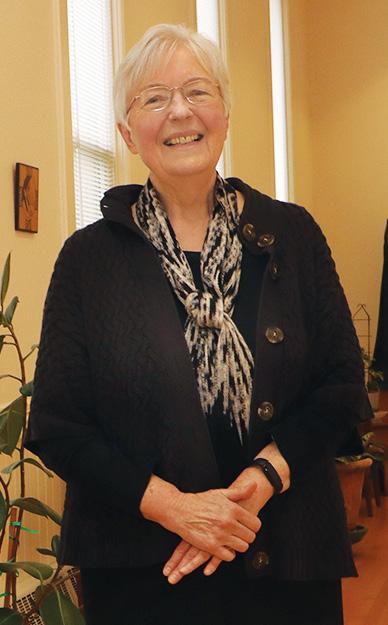
7 minute read
Family tradition New burger spot makes a splash
By Melissa Wagoner
When Ibet Lopez opened the doors of her new restaurant, Mountain Burgers – located in the parking lot of Silverton’s Ace Hardware and Hi-School Pharmacy –she wasn’t sure what she should expect. But she needn’t have worried.
“It was insane,” she recalled. “We sold out twice.” And it’s been busy ever since.
Thankfully, Lopez is no stranger to restaurants. She grew up around Silverton’s Water Mountains Restaurant, owned by her parents, Obed and Angelina Lopez – since she was seven years old.
“It’s hard work,” Ibet said. “But we know how to do this.” By “we” she means the many family members currently helping her with the business, including her father, Obed.
“My dad’s the brain behind it all,” Ibet confirmed. And it seems word has gotten out.
“Right now, it’s a lot of my parents’ clientele,” Ibet said of the familiar faces she has seen coming through the door of Mountain Burgers. “They say, ‘We heard [your parents] are opening this.’ Which is a testament to my parents’ involvement in the community.”
It’s also a testament to her parents’ success as restaurateurs who appear to have opened not one, but two, successful restaurants in the same town.
Mountain Burgers
402 McClaine St, Silverton
503-874-4014
Open: 11 a.m. - 8 p.m.
Water Mountains

Restaurant
1398 S. Water St., Silverton
503-873-6089
Open: 8 a.m. - 7 p.m.
“It’s completely different,” Ibet said of Mountain Burgers’ menu, which consists of burgers, fries and shakes. “But if you liked Water Mountains, and you know the type of family we are, you can expect the same here.”
Open every day from 11 a.m. to 8 p.m., Mountain Burgers offers customers both a dine-in and a to-go option.
“We’re working on getting our online ordering up,” Ibet added.
In the meantime, customers are encouraged to call 503-874-4014 and to pick up their order at the restaurant’s drive through window, both of which may help them avoid the line. Because, as Ibet happily related, “It’s been very busy.”
Presenting Sponsor: The Satern Agency – Country Financial

Platinum Sponsors: Roberts, Ring & Fischer • Willamette Valley Bank
Gold Sponsors: Silver Creek Auto Body • Silverton Realty
Silver Sponsor: Our Town
Event Sponsors: Renee & Mark Hunter • Cindy & Morry Jones


M.C. Jones Properties • Rebecca & Jens Lerback
Donna & Eric Reif • Julie Nash – Loan Depot
Food Sponsors: Willamette Valley Pie Co.
Editor’s note: This is the second in a series of articles about the future of the Benedictine Sisters and the Queen of Angels Monastery.

By Stephen Floyd
Sister Dorothy Jean Beyer knew she wanted to be a nun in the second grade.
She attended St. Mary’s School and admired the work of the Benedictine Sisters of Mount Angel who taught her classes.
After graduating high school in 1961, Beyer entered the order at the height of its membership, with a community of more than 140 Sisters led from Queen of Angels Monastery. This was a far cry from the dozen-or-so European immigrants who founded the order in 1882.
These early years for Beyer would be marked by significant shifts in the Catholic world that would see membership slowly decline across religious communities. Today the Benedictine Sisters of Mount Angel have 16 members, including Beyer, and they are transitioning out of the monastery as they prepare to sell the property.
Our Town spoke extensively with Beyer about the transition, as well as Pastoral Administrator Sister Jane Hibbard.

The series draws heavily from A Tree Rooted in Faith by Sister Alberta Dieker, a thoroughly-researched history of the order published in 2007.
The monastery was able to thrive in the years after the death of foundress Sister Bernadine Wachter in 1901. It endured anti-German sentiments during WWI and WWII, scandalous attacks by an antiCatholic newspaper in Silverton, and the turbulence of the Great Depression.
By the 1950s, the order had missions in Oregon City, Woodburn, Albany, Portland,
Silverton, Shaw and Lebanon, and helped staff a school in British Columbia.


In 1955, the Sisters started a healthcare ministry that would become Providence Benedictine Nursing Center. That facility now includes Orchard House Assisted Living, where a majority of the Sisters now reside.
Dieker said the mid-20th Century was “a time of optimism and growth,” including a revived interest in traditional rites such as Gregorian chants and celebration of the Eucharist. This increased time in prayer and reflection led the Sisters to ask: What is essential to Benedictine life? Changes in the coming years helped reveal the answers.
A significant opportunity for reflection came from the Second Vatican Council, also called Vatican II. This was a series of ecumenical meetings held between 1962 and 1965 with the goal of reexamining how the church was reaching out to an increasingly-secular world.

Vatican II determined everyday church members could serve a broader role in ministry, meaning it was no longer necessary to become ordained to participate in official ministries.
Hibbard said this is when membership began to diminish, because women who wished to join for roles in education and healthcare could now enter those fields directly.


In addition to this were counter-culture revolutions in the ’60s that pushed back against many traditional ideas. It was more acceptable for women to become professionals, and religious orders were no longer among a limited number of options.

“It’s just a different time,” said Hibbard. “And young women have millions more options than they had in the 1800s.”
Even with these changes, many women still felt the call to monastic life, including Beyer. She said, though the nature of church and society were evolving, the Sisters rallied around their ministries, particularly education.
“We had a common endeavor that drew us to a mission,” said Beyer. “...We’re all seeking God together, so we’re supporting each other.”
That calling would be challenged, as the schools operated by the Sisters went through their own changes.
Mt. Angel Academy, a boarding high school that opened in 1888, saw its last class of students graduate in 1964. The community no longer had a need to board students and was putting its support behind what would become John F. Kennedy High School.

Mount Angel College, was founded as Normal College in 1897 to train teachers. The college had boomed during the 1950s and the Sisters took out a loan to expand the building, but enrollment declined and they could not keep up with financial obligations. It closed in 1974 and the space became home to Colegio Cesar Chavez for several years.

Beyer said the Sisters were able to withstand change and challenges by turning to the root of monastic life.
“Prayer and faith and hope, and of course love, sustains all the challenges we have,” she said.

There was perhaps no more challenging moment than in 1975 when around 150 children and refugees from South Vietnam were brought to Mount Angel after the fall of Saigon. Dieker said the Sisters were given just two days notice to prepare, and ended up housing the new arrivals in the Oktoberfest building. Locals donated food, clothes and bedding.
The Sisters cared for the children as they worked to reconnect them with relatives, or find homes for those who were orphaned. For refugees who were old enough to work, the Sisters helped them find jobs and integrate into the community.
This work took more than a year and Beyer said, almost five decades later, there are still some former refugees and their families who keep in touch.


“We still hear from some, we still feel very connected,” she said.


Beyer said, even with so much change during the last several decades, she is still glad she joined the order. She grew up in Mount Angel and has been glad to stay near her earthly and heavenly families.
“I like Mount Angel,” she said. “It’s a small town, but everybody pretty much knows each other. And they help.”
When asked what advice she would have given her 18-year-old self, Beyer said she would encourage the younger woman to embrace the unexpected.
“Always be flexible, always be resilient, because we never know what life is going to throw at us,” said Beyer. “Don’t look at life as a problem, but look at life as an adventure filled with possibilities.”
Hibbard said she would caution herself to be patient and depend on her community, because even though the early years felt difficult she eventually found her place.
“For me it’s been an absolutely wonderful life and I wouldn’t change it,” she said.
Here is an overview of local candidates and measures on the May 16 ballot. To have your vote count, ballots must be submitted to an official site by 8 p.m. For a list of locations go to: co.marion.or.us/CO/ elections/ and click on Ballot Drop Sites.
Mt. Angel School District

Position 1: Irene Novichihin, a retired educator with 31 years of experience as a teacher and principal with the Woodburn School District. She was appointed to the board in 2022 and is seeking her first elected term.
Position 4: Teresa Kinkaid, a retired educator with 37 years of experience, including 25 with the Mt. Angel School District. She was first elected to the board in 2019.
Measure 24-482: A $7 million bond to improve school safety, replace aging systems and renovate facilities. Approval would allow the district access to a $4 million state grant.
Mt. Angel Fire District
Position 1: Tom Frey, a retired IT director for Marion County. He was first elected to the board in 2011.
Position 2: Ron Vandecoevering, a local farmer and graduate of JFK High School. He was first elected to the board in 1995 and is seeking a fourth non-consecutive term.
Position 3: Phil Wiesner, a farmer and retired educator with 36 years of local teaching experience. He was first elected to the board in 2003.

Silver Falls School District

Four open positions and eight candidates running. See our coverage on the candidates at www.ourtownlive.com/ ourtown/?p=13351

Silverton Fire District

Position 1: Stacy Palmer, executive director of the Silverton Chamber of Commerce since 2000. She was first elected to the board in 2019. Palmer has also served on City of Silverton committees related to transportation and urban revitalization.
Position 5: Robert Mengucci, a firefighter and paramedic with nearly three decades of experience. He was first elected to the board in 2019. Mengucci also served in the U.S. Marine Corp from 1990 to 1997.
Silver Falls Library District
Three open positions:
Nancy Miller, an English teacher at Silverton High School. This would be her first role in elected office.
Michelle Sanguinetti, a revenue coordinator with Blue Communications. This would be her first role in elected office.
Megan Smith, programming director for Sheltering Silverton. This would be her first role in elected office.










